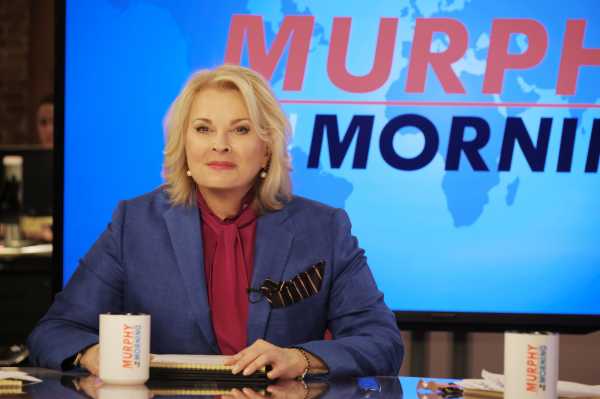
In their 1997 book The Fourth Turning, authors William Strauss and Neil Howe attempted to explain American history via a series of endlessly repeating cycles, with each one spanning between 80 and 90 years.
In Strauss and Howe’s telling, you can reduce the country’s history (and human history more generally) to an endless sequence of crises, leading to reunifications, leading to awakenings, leading to unravelings, leading to more crises.
An idea within The Fourth Turning that feels particularly resonant in 2018 is that of the Gray Champion. Taken from a famous Nathaniel Hawthorne short story (in which the ghost of an old man shows up to taunt some British soldiers in the 17th century), the Gray Champion is an older person whose interests align with a younger “hero” generation in the midst of a vast crisis, and the resulting coalition of the Great Man and the Great Generation summarily ends the crisis and saves the world. Past Gray Champions have included Abraham Lincoln and Franklin Delano Roosevelt — so, y’know, big shoes to fill.
The Fourth Turning is one of those works of pop sociology that feel incredibly convincing as you read them, until you realize just how feverishly Strauss and Howe are working to force history to conform to their thesis. But it is kind of compelling how they predicted, in 1997, that the 2010s would be another crisis period, when society would seem on the brink of utter collapse, and a Gray Champion would emerge to carry forward the hopes of a new, younger generation.
The obvious question, then, is “Who will our Gray Champion be?” Barack Obama? Hillary Clinton? Donald Trump? Elizabeth Warren? Ted Danson?
Well … what if it was Murphy Brown? The fictional news anchor is back on CBS for her first season of sitcom shenanigans since 1998. And sometimes it can seem as if all involved in the show believe she’s here to save the republic. Look to the East! There your Gray Champion rides, America! She is the great baby boomer liberal lion Murphy Brown!!!
I’m … not so sure I buy any of the above. But to explain why, I’ll have to go back to the beginning.
Murphy Brown — and Murphy Brown — explained
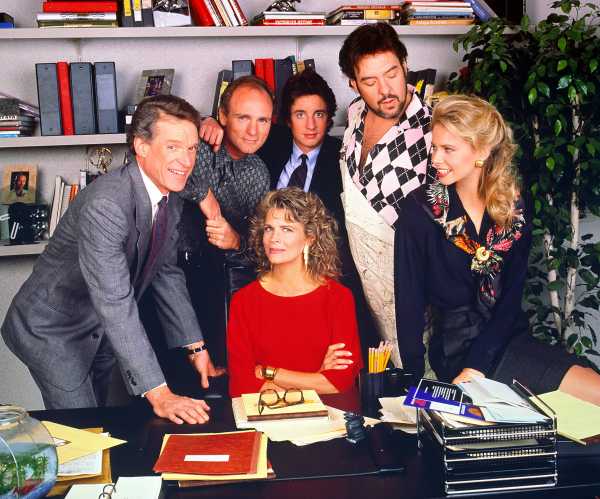
Murphy Brown, which originally ran on CBS between 1988 and 1998, was hugely significant during its era, but has mostly disappeared from the public consciousness in the two decades it’s been off the air. In its heyday, the show won 18 Emmys, including two trophies for Comedy Series and five for Lead Actress, honoring star Candice Bergen.
And when it debuted in 1988, Murphy felt like a blast of fresh air. But not because its lead was a bold and brassy woman who told it like it was and didn’t define herself via the whims of a man — TV was actually a pretty great place to be a bold and brassy woman in the late ’80s, thanks to shows like The Golden Girls, Designing Women, and Roseanne. (You could argue that things have actually gone backward in this regard just a little bit, and I probably wouldn’t disagree all that much.) No, what made the show feel so fresh was its willingness to play around with darker, richer themes, at least up to a point.
When Murphy first returns to the newsroom of the fictional TV program FYI in the series’ groundbreaking pilot (for which series creator Diane English would win an Emmy for her script), she has just completed a lengthy stay at the Betty Ford Clinic, where she was being treated for alcoholism. She’s an unrepentant work in progress who is occasionally cruel to even her best friends, demanding in her perfectionism, and unwilling to sacrifice even a tiny piece of her career for anything else.
Murphy is not alone in the annals of TV heroines in terms of her show’s willingness to risk alienating (male) audiences in the name of pursuing her character’s truth, but there are very few other characters at her level. And yet she was a very late-’80s depiction of what feminism meant, clawing out a place in the news media firmament with guts and gusto, and she would be damned if she was going to give up one iota — especially not to the younger, less bold, less brassy women trying to climb the ladder behind her.
In the first season, especially, Murphy’s brand of tough womanhood is contrasted, frequently, with the younger, cuter Corky (Faith Ford), a beauty queen who takes a career in the news media somewhat for granted. The show doesn’t hate Corky (even if Murphy sometimes does), but it’s not hard to feel the eye roll it’s barely restraining. It’s one of TV’s earliest depictions of the clash between second- and third-wave feminism, and it’s one of the things that has aged the least well about the series.
Too often, it seems as if Murphy is less interested in changing the rules of the game to make things better for all women, and much more interested in changing the rules to make things better just for Murphy, who sees herself as the only gal with the guts to take on the men. In its best episodes, Murphy Brown interrogated this tension; in too many of them, it just took Murphy’s side. (Alison Herman of the Ringer has much more on this.)
Related
Revisiting the First 10 Seasons of ‘Murphy Brown’
English was responsible for the first four seasons of Murphy Brown, including the Emmy-winning second and fourth seasons. And though the series has dated considerably, thanks to its frequent political references, English’s interest in Murphy not just as a journalist or a political figure but as a flawed and very human woman kept the show from completely falling apart, even as it frequently threatened to.
English could also write crackerjack workplace comedy, and she populated the FYI newsroom with fun characters, like Murphy-foil Corky, in-over-his-head producer Miles (Grant Shaud), Murphy’s womanizing best friend Frank (Joe Regalbuto), and stentorian blowhard (and occasional voice of wisdom) Jim (Charles Kimbrough). She turned a local bar into another hangout for Murphy and company, and, in the show’s most sitcom-y conceit, had a philosophical house painter spend years painting Murphy’s house, trying to perfect his art.
Most impressively, English kept the show similar to its most obvious antecedent — the newsroom-set Mary Tyler Moore Show — without feeling like a ripoff or even an homage. Mary Tyler Moore was smaller; homier, even. It took place at a local news station, after all, and its theme song insisted that love was all around, if Mary went looking for it. Murphy Brown was more adult and more cynical, like the national news show where it was set. It didn’t have a theme song, but it played Aretha Franklin’s “Respect” all the time. Who needed love, really?
Not Murphy herself. At the end of season four — English’s last season on the show — Murphy gave birth to a baby boy and became a single mother. And then all hell broke loose.
Dan Quayle’s war with Murphy Brown (and vice versa) was a turning point for both its rise and its fall
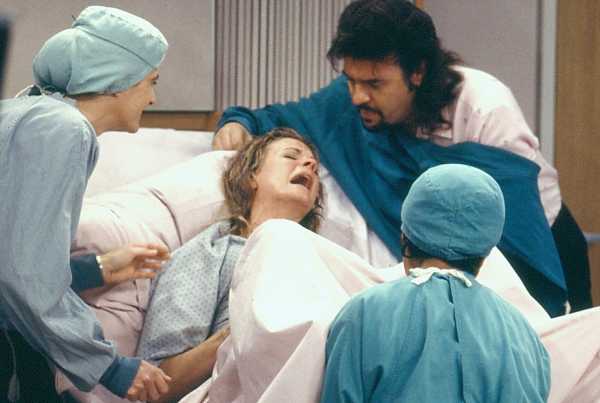
From the first, Murphy Brown was an unabashedly liberal show, in the old ’60s sense of the word. It debuted in the waning days of Ronald Reagan’s presidency and left the air in the middle of Bill Clinton’s second term, when many who leaned left had grown disillusioned with a president who had cut deals with Republicans in Congress and hadn’t delivered on some of his most progressive promises. And it dealt with all of that, occasionally memorably.
But it more often just … made fun of Republicans. Yes, the characters gave great speeches about how liberal plans could help people (often via editorial addresses delivered on FYI), but a lot of the time, a joke would be set up and set up and set up, and then the punchline would boil down to “Dan Quayle!” (Or, later in the show’s run, “Newt Gingrich!”) There was a method to this, according to English. In 2013, she wrote for the LA Times:
Quayle, George H.W. Bush’s vice president, certainly provided the show’s first four (and, again, best) seasons with plenty of material. He was the “Can you believe how dumb this guy is?” politician of his era, most famously spelling potato with an added -e, but also uttering many, many, many amusingly stupid quotes. As English says — fish in a barrel.
The show’s constant prodding of Quayle built to a head in Murphy Brown’s fourth season, in which Murphy decided to continue the pregnancy she learned of in the season three finale. The whole season was spent on the sorts of issues English loved to tell stories about, where the personal and the political intersect, as Murphy genuinely weighed whether to keep the baby, then tried to figure out how to fit a baby into her life, then finally gave birth in the season four finale. (Bergen was perhaps never better than when Murphy gazed down with adoration at her infant son, at once both a new mother and still recognizable as tough, flinty Murphy Brown.)
Season four was the show’s cultural high watermark, the most-watched season out of all 10. It ended up ranking third in the year’s Nielsen rankings, behind only 60 Minutes and Roseanne, and it helped drag the entire CBS Monday-night lineup into the Nielsen top 20, with three out of the lineup’s five shows landing in the top 10. CBS, which had spent much of the ’80s struggling to escape its growing reputation as a network filled with stodgy, conservative storytelling, was only too happy to have this zeitgeist-driving, Emmy-winning program leading the way.
And then on May 19, 1992 — the day after Murphy gave birth in the season four finale — Quayle pulled the fictional character into a speech about the then-recent turmoil in Los Angeles after the officers who beat Rodney King were acquitted. In a throwaway line, Quayle said, “It doesn’t help matters when primetime TV has Murphy Brown, a character who supposedly epitomizes today’s intelligent, highly paid professional woman, mocking the importance of fathers by bearing a child alone and calling it just another lifestyle choice.”
With any other show, and perhaps with any other politician, the firestorm that erupted and eventually consumed pop culture for much of the summer of 1992 would have been much smaller. But Quayle’s quote turned what was then one of TV’s biggest hits into a new front in the culture war, and the fact that Murphy Brown was so central to the zeitgeist and fond of mocking Quayle only added fuel to the fire.
Quayle claimed, after the speech, that he had never seen Murphy Brown. (The first episode he saw would be the season five premiere, which aired the following September and concluded with a fiery monologue Murphy delivered to the vice president.) And his protestation of ignorance certainly seemed to be true. He was just trying to make a pop culture reference to score a few points in a speech about something else.
But the battle lines were drawn almost immediately after Quayle’s speech in May, and the Murphy Brown team only dug them in deeper at the Emmys in August, where they took home the Comedy Series trophy. English, as she concluded her speech accepting the award, snarked: “As Murphy herself said, ‘I couldn’t possibly do a worse job raising my kid alone than the Reagans did with theirs.’”
The show was suddenly the biggest show on television, and the season five premiere was its most-watched episode, with 70 million viewers tuning in, roughly 41 percent of everybody in the US watching TV that night.
Murphy Brown would never be that big again. And the ways in which it ultimately fell apart underline why the revival season that debuts Thursday, September 27, is so disappointing.
The slow, sad decline of Murphy Brown
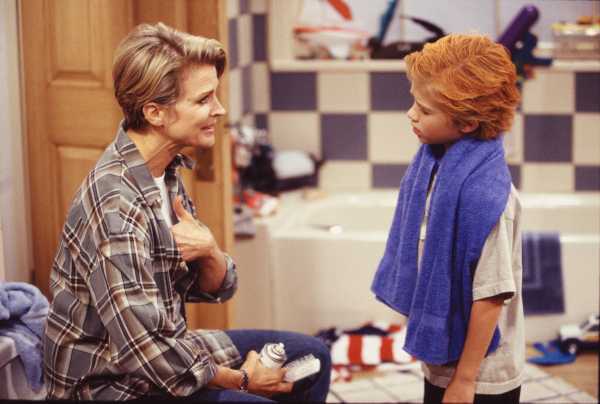
As Murphy Brown ended its fifth season, everything seemed to be going great. Its fifth season ranked only slightly lower than its fourth in the Nielsen ratings, finishing fourth for the season overall. It was nominated for the usual passel of Emmys in the summer of 1993. But the cracks in the foundation were there. Three things — which had all been present in the season five premiere — doomed the show in ways that were already in motion, even if nobody involved realized it quite yet.
Diane English left. At the end of Murphy Brown’s fourth season, English exited both the series and its home of Warner Brothers Television, in hopes of building a TV empire of her own.
Her first post-Murphy Brown project was the series Love & War, starring Murphy Brown guest star Jay Thomas (he played one of Murphy’s love interests). Love & War ran for three seasons on CBS, mostly drafting off its Murphy Brown lead-in. But English never hit the heights of Murphy Brown again, despite creating other shows (Double Rush, Ink) starring both former Murphy Brown actors (like Robert Pastorelli, who played painter Eldin) and giant TV stars like Ted Danson.
When English departed Murphy Brown, she didn’t leave the show in the lurch — the writers’ room still contained several amazing writers — but without her around, the characters started to feel less themselves. (She returned to write the series finale in 1998, and is now back for the revival season.)
Murphy had a baby. To be clear, Murphy Brown did a good job of not drowning itself in stories about babies and cute kids. But the show did feel the obligation to tell stories about motherhood, and those stories led to some of its weakest episodes, even in the comparatively strong seasons five and six.
By the time Baby Avery had become Child Avery (played by Haley Joel Osment in the show’s final season), Murphy was too often a typical sitcom mom and not her snarling self. The show never quite figured out how to tell a story about a woman whose career existed comfortably alongside her motherhood, and it eventually stopped trying.
Murphy Brown became a show almost entirely about responding to the political moment. To be sure, this was also true for a key portion of the English era. But with George H.W. Bush defeated by Bill Clinton in the 1992 election and the huge boost that Quayle’s comment had given the show’s buzz, the series gravitated toward easier and easier political jabs and stories that commented on the issues of the day without trying to find the reason Murphy cared about them in the first place. (English’s best episodes had always managed to weave the politics into Murphy’s personal life in fascinating ways.)
Or, worse, the series would try to force a reason for Murphy to care, as when Corky is sexually harassed, but the story ultimately hinges on whether Murphy sexually harassed a male executive. The show had always been preachy, but in a vaguely palatable way where the preachiness felt grounded in the characters. Too often in seasons five and later, it was just preachy for the sake of being preachy.
At the same time, Murphy Brown also started to suffer all the typical problems that befall aging hit TV shows, like characters randomly pairing off (Miles and Corky got married at one point, for some reason), or core characters leaving the show (Miles departed at the end of season eight and was replaced by Lily Tomlin), or just a growing sense that the series had repeated itself too many times.
In its 10th and final season — which wasn’t a return to form, per se, but a better season than the few that preceded it — Murphy Brown gave its heroine one last big story arc. She got breast cancer, and the show ultimately went on its way with a series finale where Murphy, under the knife, hallucinates an interview with God.
And then Murphy Brown mostly disappeared. The timely political and social references that made it such a buzzy show in the early ’90s very quickly stopped making much sense if you weren’t steeped in ’90s arcana, so it was a flop in syndication and on Nick at Nite. Warner Brothers tried to put the show out on DVD, but the first season didn’t sell, so no further seasons were released. And the use of multiple Motown hits in the soundtrack meant licensing the music would be too expensive for the show to land on streaming (though a handful of classic episodes have made their way to CBS All Access in advance of the revival).
While it still played on a handful of smaller channels dedicated to reruns of old sitcoms, all the pieces were in place for Murphy Brown to fade away as much as any TV show does nowadays.
But then Donald Trump was elected to the presidency. Which brings me back to the idea of a Gray Champion…
The new Murphy Brown is an email forward masquerading as a TV show — but there’s something weirdly comforting about it all the same
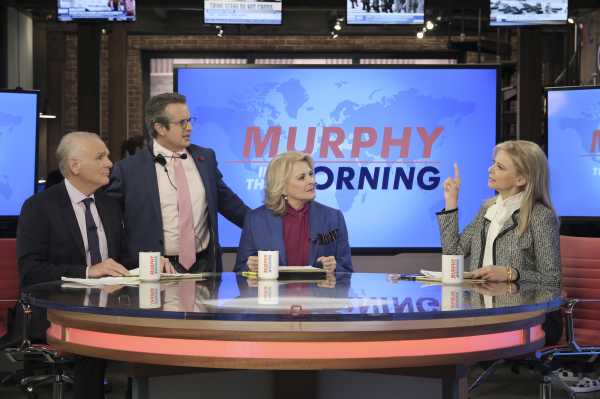
I’ve seen three episodes of the new Murphy Brown season, which picks up in the present day and reunites Murphy and most of her pals at a cable news morning show. They’re not good. I didn’t laugh, the jokes are mostly easy potshots at Trump (would you believe Murphy calls him “orange” in the first episode?!), and the live studio audience is so over-mic’ed that every little utterance they make sounds like wild laughter and applause.
vox-mark
vox-mark
vox-mark
vox-mark
vox-mark
What’s more, the show feels as if it’s abruptly pulling its punches. Sure, it has fun with Trump, but what comedy doesn’t? When it comes time to situate Avery — now a grown man played by Jake McDorman — at his own journalism job, he ends up at “Wolf News,” which is supposed to be Fox News but also doesn’t seem particularly conservative from what we see of it.
Avery is the network’s “liberal voice,” which means every episode of his show involves him traveling to some working-class hangout in some blue-collar neighborhood fallen on hard times to ask people what they think about America, like a constantly metastasizing New York Times “welcome to Trump country” profile occupying valuable television real estate. Wolf News never feels like a real network, nor does Avery’s show feel real.
But, then, neither does Murphy’s show. She, Corky, and Frank have moved on from their FYI past to host a sort of Fox & Friends for people who watch Murphy Brown — produced by Miles, of course. (Charles Kimbrough has mostly retired from acting, so Jim isn’t a regular, though he will make guest appearances throughout the season.) And that’s not a bad idea for a rejuvenation of Murphy Brown’s show-within-a-show. Murphy in the hollow confines of morning TV? Could be fun!
But instead, Murphy in the Morning is just … a different version of FYI. In one episode, when a Steve Bannon-esque figure is ready to give his first TV interview, Murphy’s new boss thinks he should go on Murphy in the Morning, which is something that would never happen. Morning shows occasionally land huge interviews, but not brand-new morning shows, to say nothing of brand new-morning shows on cable news networks that viewers have no context for. (It’s not clear if Murphy’s new network is supposed to be CNN or a plucky upstart, as the show vacillates between the two ideas.)
The episode that follows is the best of the three CBS sent out for review, and it digs into fascinating questions of whether interviewing figures like Bannon only serves to legitimize them, no matter how hard you push back against their beliefs, in ways that are at least somewhat complex. But the ending tries to have its cake and eat it too, ultimately letting down everything else that happened in the episode.
Thus, the new Murphy Brown feels detached from any reality other than an all-caps email forward about how Trump is [bad/disgusting/unacceptable/take your pick]. It exists in a world where support for Trump is inexplicable, and if the press could just find the right words, it might make him disappear.
Some of that thin-ness of premise is acceptable and probably inevitable in a sitcom where Murphy might sneak into the White House under the guise of a French reporter (as she does in episode two). But Murphy Brown never tries to understand how things could have gotten to where they are now. Instead, it takes every opportunity to harangue America, Republicans, and the press for not having the calm, collected wisdom of Murphy Brown.
Unlike the recent Roseanne revival, which had major problems but genuinely seemed interested in confronting 2018 America (at least sometimes), this new Murphy Brown is interested in what’s become of America only insofar as Murphy can yell about it. (It’s also, somewhat amusingly, interested in how America doesn’t remember Murphy Brown or Murphy Brown.) The series positions its namesake character as the sane voice calling out in the wilderness, but the show has always been at its best when it called her on her own bullshit.
Related
The Roseanne revival, and the argument over how TV depicts Trump supporters, explained
It also doesn’t really try to grapple with the political fault lines of the country as they exist today. Murphy and all of her friends are just sort of vaguely Democrats, and they don’t like the Republicans, and that’s that. This approach especially hurts Avery, who could have been a leftist podcaster, or a right-wing reactionary, or something befitting his status as a 20-something dude of an entirely different generation — as well as something that would have driven substantive conflict with his mom — instead of just “a liberal.”
And yet there’s something compelling here. For as sitcom-silly as it is for Murphy Brown to be dragged into a tweet war with the president in the season premiere, you can really feel the way English and all involved long to turn this character into the Gray Champion, the one who will lead us all back from the brink of darkness by vanquishing Trump on his own Twitter turf.
The Murphy Brown of Murphy Brown isn’t a woman so much as she’s a symbol of a more normal world that has been lost now, , but maybe that’s what viewers want or even need. The idea that she could stand in for that normalcy requires a lot more faith in broadcast television — and fictional depictions of journalistic institutions — than I’m used to investing in this decentralized age.
She’s a specific panacea to people old enough to remember Murphy Brown, peddling a kind of sitting-on-your-couch activism designed not to effect change, but, instead, to make you feel less alone in these scary times.
Related
The classic American sitcom is exactly what we need in this fractured political moment
But there’s a value to that. And, hey, I’m old enough to remember Murphy Brown! Its charms are not completely lost on me. Every so often, there’s a flash of the old show’s panache, or a line-reading that Bergen knocks dead, or a flicker of terror at how bad things have gotten and how bad they could still get, and the show comes to life, for a moment at least.
It’s not good, but it’s comforting. That normal world doesn’t seem so far off when those moments arrive. And maybe the idea that art can still clumsily shout truth to power in the form of over-obvious one-liners is its own kind of electricity.
This is, after all, an era of a president who knows, intuitively, how to make any given culture war 10 times bigger, and an era of women pushing back against a world that has always mistreated them. It’s an era when the simple act of existence for so many people — and so many women — feels like defiance, rather than the humdrum reality of life.
I don’t know if Murphy Brown, unaware of its own privileges and blind spots, is the champion I would drag out of the past to send into that battle, but hey, she’s dealt with all of this before. Maybe she can again.
Murphy Brown season 11 debuts Thursday on CBS at 9:30 pm Eastern, with a special 35-minute episode.
Sourse: vox.com






